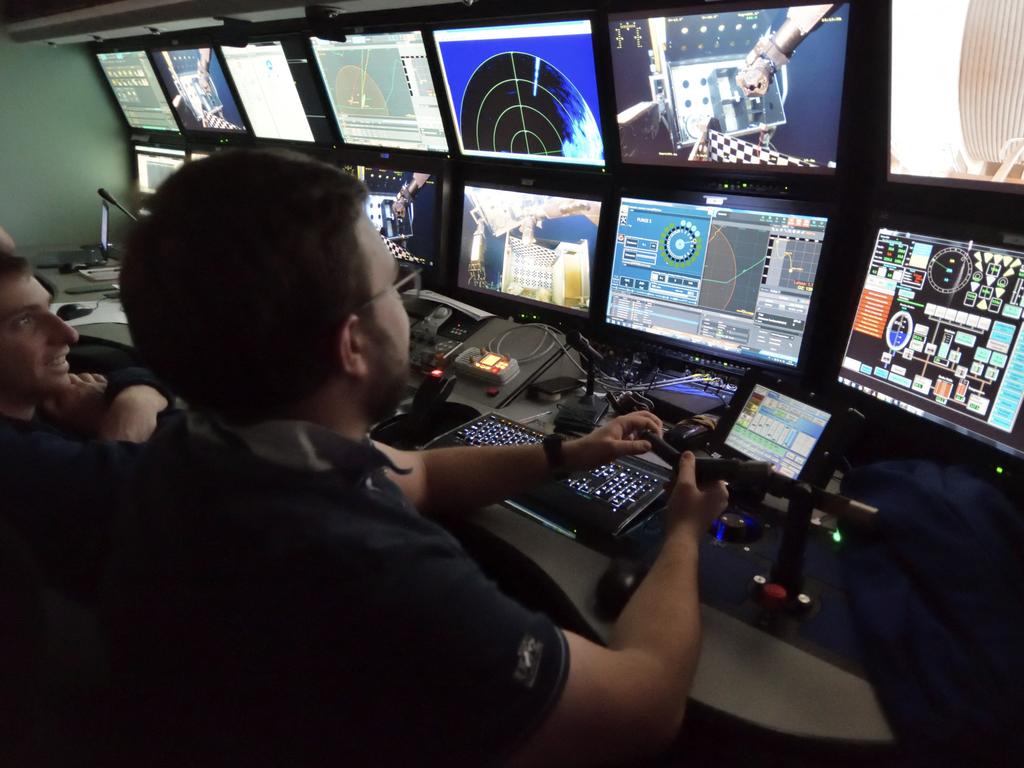
This article is more than
2 year oldA massive search and rescue effort for a missing submersible near the wreck of the Titanic is at a critical stage, with just over one hour left before the oxygen supply for the five people on board runs out.
The vessel descended into the North Atlantic early on Sunday morning local time with 96 hours of oxygen onboard — meaning it will run out at 9.08pm AEST.
As the search continues, it’s been revealed that the craft was designed to return to the surface after just 24 hours, according to Aaron Newman, an investor in OceanGate who visited the site on the vessel in 2021.
He told CNN the Titan is held underwater by ballast — heavy weights that helps with stability — built to be automatically released after 24 hours to send the sub to the surface.
“It is designed to come back up,” he told CNN.
Crew members are told they can activate this by rocking the ship or use a pneumatic pump to knock the weights free, Mr Newman said.
As a last resort, he said the lines securing the ballast are designed to fall apart after 24 hours to automatically send it back to the ocean’s surface.
“It’s going to be almost impossible. We need a miracle — but miracles do happen,” oceanographer search expert David Gallo told US media outlets.
Expert’s grim warning about ‘banging’ noise
A sonar expert has poured cold water on hopes the five people on board the Titan submersible might still be alive, offering an alternate explanation for the “banging” noises detected in the search area.
Jeff Karson, Professor Emeritus of Earth and Environmental Sciences at Syracuse University, told The Daily Mail that the sounds were most likely “debris” and “junk” from the wreckage of The Titanic.
“One possibility is that the sounds [are] bouncing around the debris, and so it‘s a more complicated echo,” he said.
“It’s just not bouncing off of one thing. It’s bouncing off a bunch of things. And it’s like, you know, dropping up a marble into a tin can. It’s rattling around and that would confuse the location. The banging — I have to say, I hear the Coast Guard guys talking about this, I wonder how much of this is just wishful thinking. Is it really banging or just some unidentified sound I think. I think that is a more accurate description right now.”

He noted that “in past investigations, looking for lost objects on the sea floor, I know that all sorts of crazy sound was discovered”.
“It’s just one more thing we don’t understand about the ocean, our own planet,” he said.
“There’s no telling where the sound is coming from or how far away it is. Personally, I’m worried that sound may be coming from something that’s far from the where they need to be looking. But they have to follow up on it. It’s the best lead right now. Everything is being done. It’s all hands on deck, international vessels, everybody is doing the best they possibly can.”
Ocean explorer Tom Dettweiler said the massive task of hauling equipment to the search site “has been done as fast as it could be”.
“It is all very large, very heavy, it had to be flown up in cargo airplanes,” Dettweiler said via CNN.
“Then it has got to be carried to the ship. This massive machinery has to be lifted on board, secured to the deck so it doesn‘t shift when the ship is rolling at sea.”
Submarine expert says bangs are ‘encouraging’
His comments came in stark contrast to an Australian submarine expert, who said earlier the “banging” noises detected in 30-minute intervals by rescuers searching for the Titan submersible were “encouraging” rescuers that the five people on board were still alive.
Frank Owen, a former Australian submarine officer and now search-and-rescue director, told the New York Post he is confident the noises are coming from inside of the Titan, as those aboard are well trained in emergency submarine situations.
“This tells me a huge amount,” he said.
“Onboard the Titan is the French former Navy diver, the Titanic expert [Paul-Henri Nargeolet]. But also because he’s a diver, he understands the way search forces look for submarines that are lost … submariners are taught that if they’re stuck in a disabled submarine on the hour and the half-hour they bang the hull for three minutes, then they stop. They don’t make any more noise.”
He added, “So the fact that we’re hearing banging at 30-minute internals tells me that the people inside are sending a message that says, ‘We understand that you would be looking for us and this is how you might expect us to react.’ So, it’s very encouraging.”

The US Coast Guard told a press conference in Boston on Wednesday afternoon — early Thursday morning Australian time — that more noises had been heard, a day after Rolling Stone first reported “banging” sounds had been picked up by a Canadian aircraft at “30-minute intervals”.
“A Canadian P3 detected underwater noises in the search area,” Captain Jamie Frederick said. “It is my understanding that the P3 heard noises today, as well.”
Read More (...)